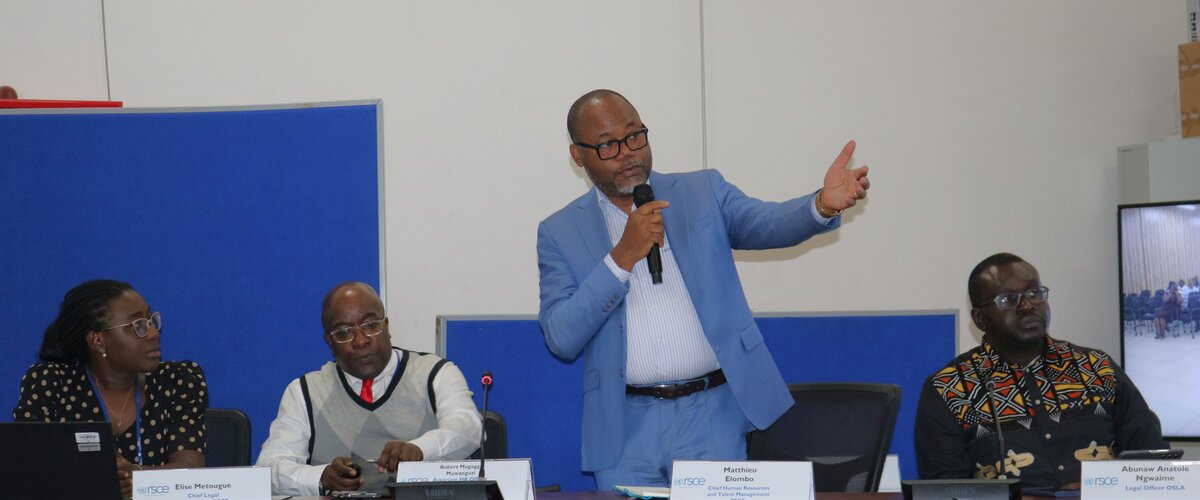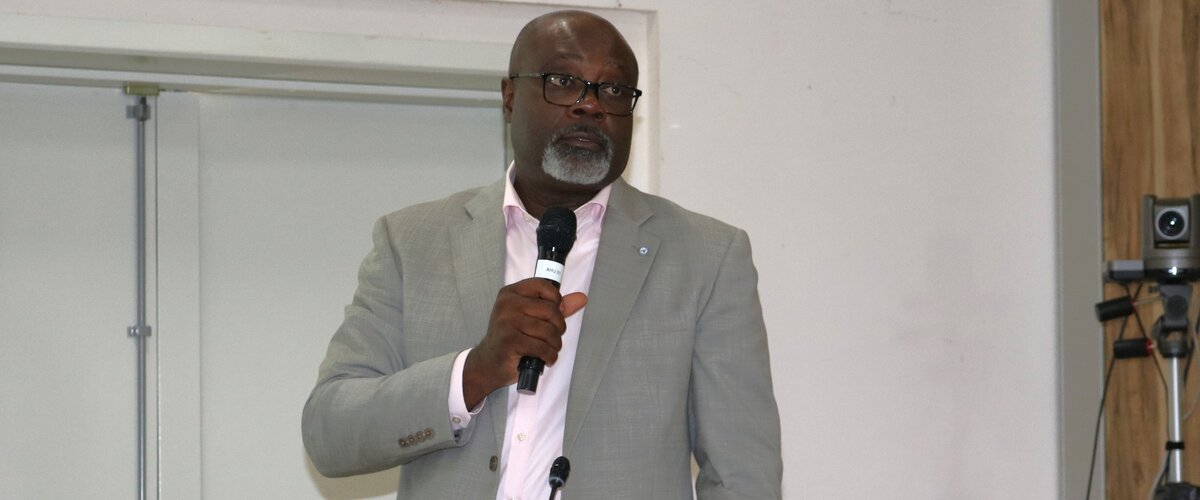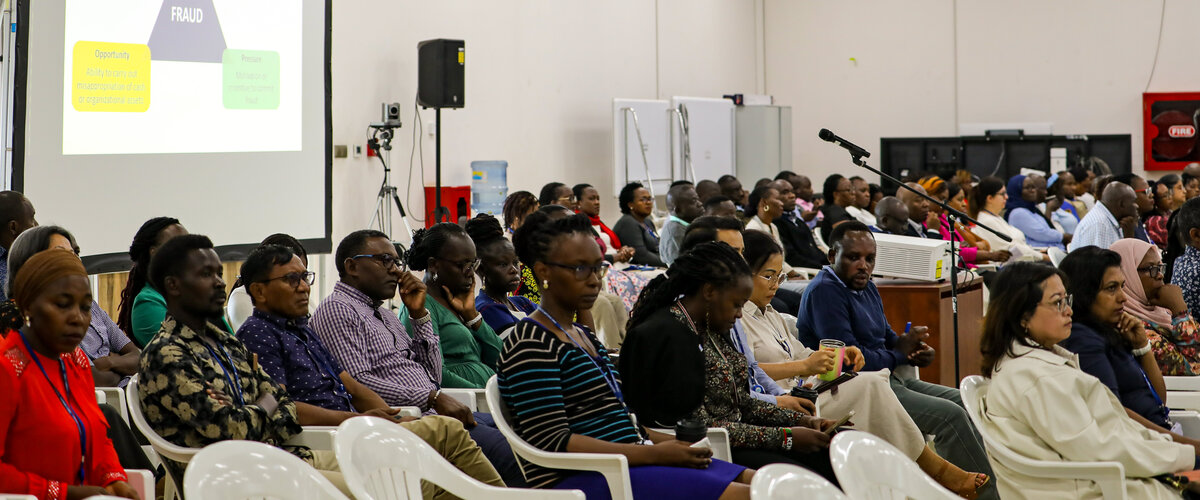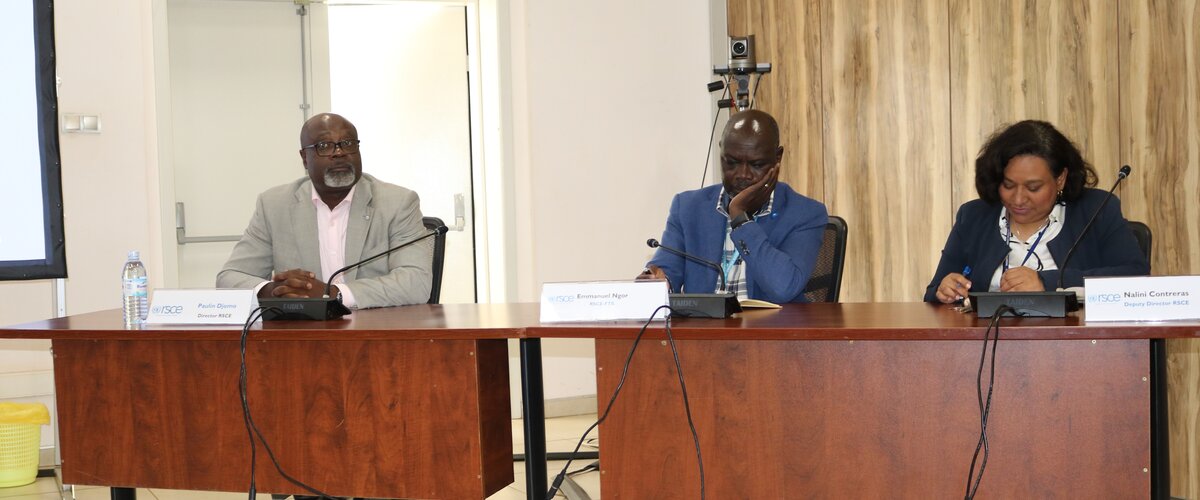RSCE Raises Fraud Awareness Through Series of Townhall Events
The Regional Service Centre Entebbe celebrates the Fraud Awareness Week for the first time in November 2023 with the aim of increasing awareness on what fraud is and how fraud can manifest itself in the various processes and functions of the Secretariat in general and the RSCE in particular.
The Legal, Audit Response and Risk Management Unit through the Office of the Director organized a series of Townhall events from 20 to 22 November to discuss Fraud and Fraud Prevention within the UN Secretariat.
Paulin Djomo, Director RSCE opened the Monday townhall and thanked staff members for turning up in big numbers. He mentioned that he had inquired from various entities whether they have celebrated the fraud awareness week and established that raising awareness about fraud is not really common. He noted that RSCE was engaging in fraud awareness campaign for the very first time and thanked Elise Metougue, Chief Legal Compliance, Audit Response and Risk Management Unit and her team for spearheading the initiative.
The Director emphasized that “…all staff have a responsibility to take action to prevent, detect and report fraud. Prevention is easier than investigation and I encourage you all to avoid investigations as they are expensive, take a long time and are painful.”
Staff were then led through presentations on Perspectives of Fraud, Internal Audit and Fraud Controls, Fraud and technology, Fraud and Corruption in the Management of Human Resources, Fraud in Procurement and The Perspective of Physical Security for UN Staff.
At Tuesday’s virtual Townhall, Mr. Rick Sanchez, Senior Ethics Officer, Ethics Office, New York led a presentation to RSCE staff on what it means to be an international civil servant and also discussed the role of the UN Ethics office, common ethical risks and conflict of interest as well as matters to do with organizational behavior, ethical dilemma, external activities, and the UN protection against retaliation policy.
During the Wednesday Townhall, Matthieu Elombo, Chief Human Resource and Talent Management Unit and Robert Mugagga, Associate Human Resource Officer, RSCE led the staff through a presentation on the UN Conduct and Discipline Policy Framework and spelt out the distinction between unsatisfactory conduct, misconduct and prohibited conduct. They also gave an insight into investigations and disciplinary process before Mr. Abunaw Anatole, Legal Officer with the Office of Staff Legal Assistance (OSLA) took the floor to explain the UN internal justice system and how OSLA support staff in resolving workplace disputes.
At the wrap up townhall, staff were reminded that the UN has a zero tolerance to fraud with a quote from the Secretary General
“The men and women serving under the blue flag across the world have a duty to uphold the highest standards of integrity, professionalism and respect for the dignity of the human person. As we serve the world's people and work for peace and the advancement of humanity, the United Nations must be a source of inspiration and a beacon of hope for all. Together, let us solemnly pledge that we will not tolerate anyone committing or condoning a crime, and in particular, crimes of sexual exploitation and abuse. Let us make zero tolerance a reality.” Antonio Guterres
Staff were given a chance to ask questions during a panel discussion led by the Director RSCE alongside Ms. Nalini Contreras, Deputy Director RSCE, Matthieu Elombo, Robert Mugagga, Elise Metougue and Abunaw Anatole.
The International Fraud Awareness Week was established by the Association of Certified Fraud Examiners (ACFE) in 2000 as a time to raise awareness about fraud and to encourage business leaders and employees to proactively take steps to minimize the impact of fraud by promoting anti-fraud awareness and education.
The key objectives of the RSCE Fraud Awareness Campaign are to increase awareness on what constitutes fraud, understand the (potential) scale of fraud and corruption and identify factors that affect/determine exposure to it and to understand key activities and actions intended to prevent, detect, and respond to fraud.
 UN
UN United Nations Peacekeeping
United Nations Peacekeeping







